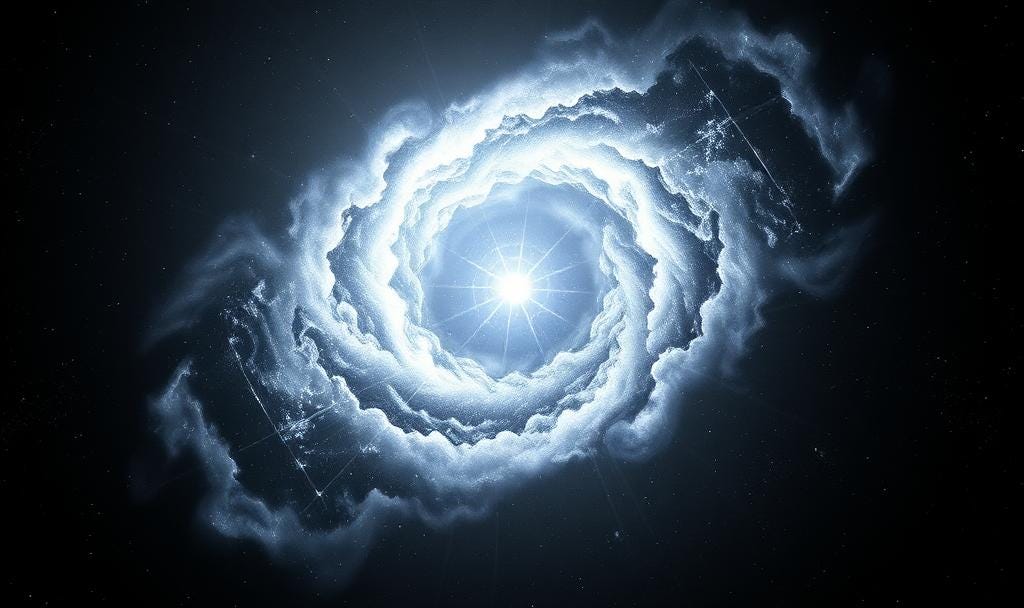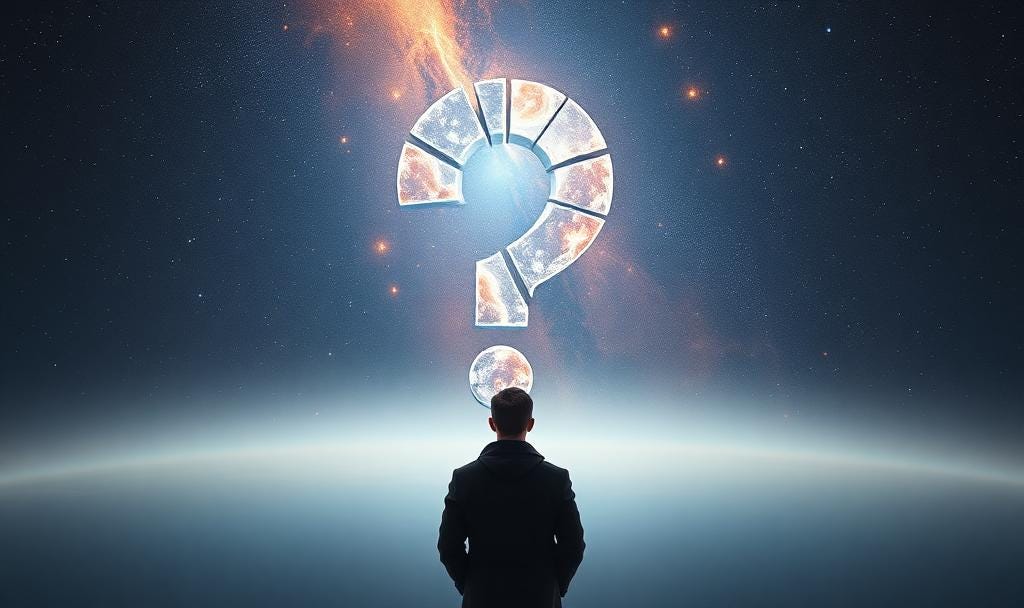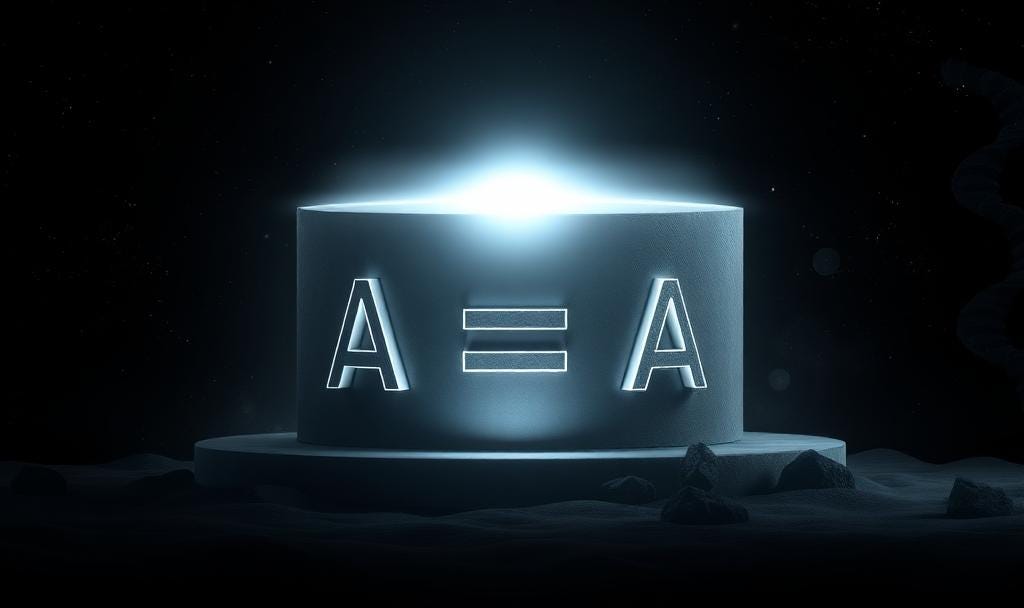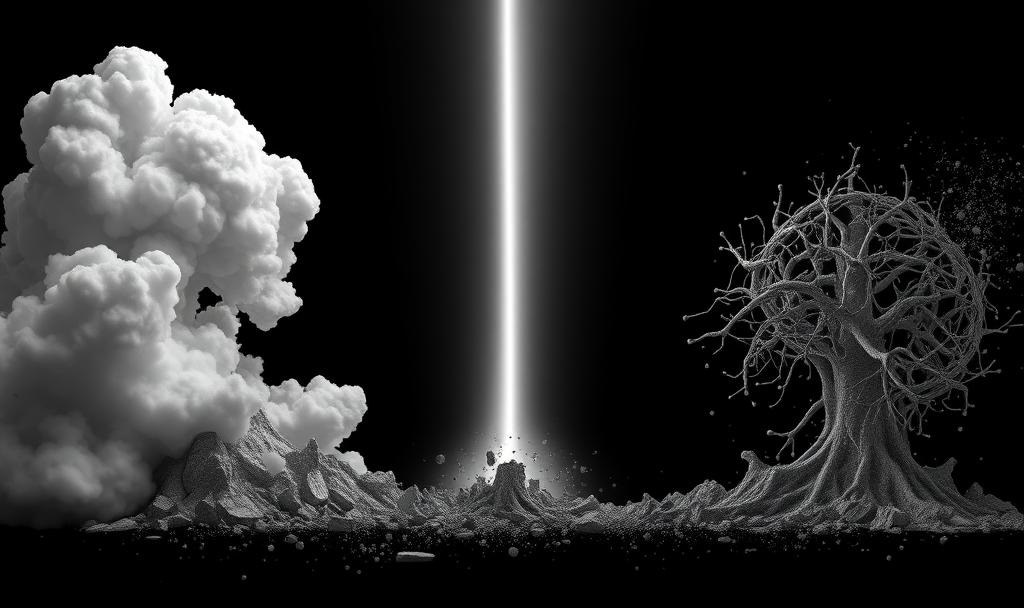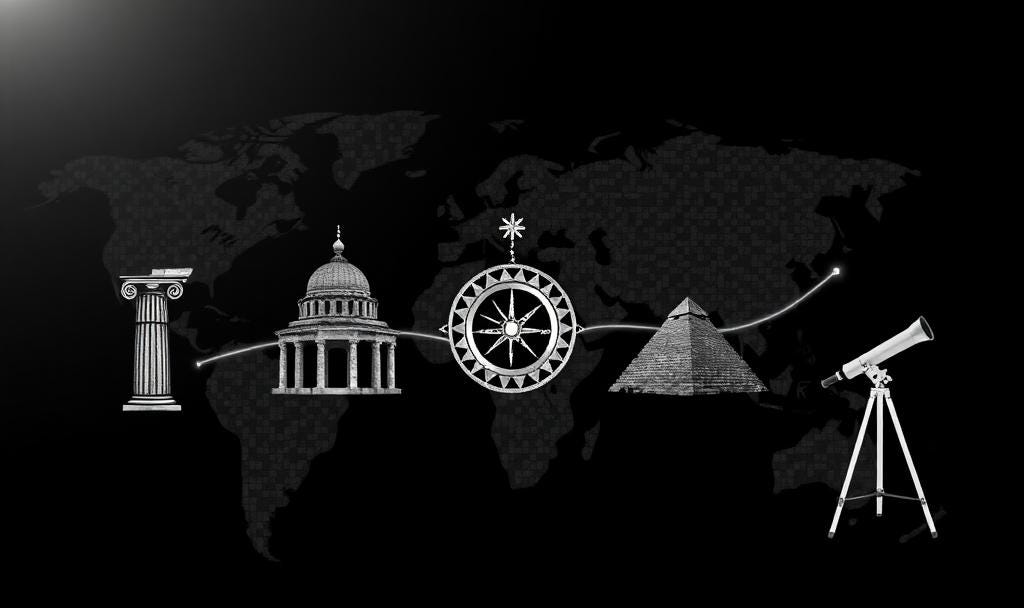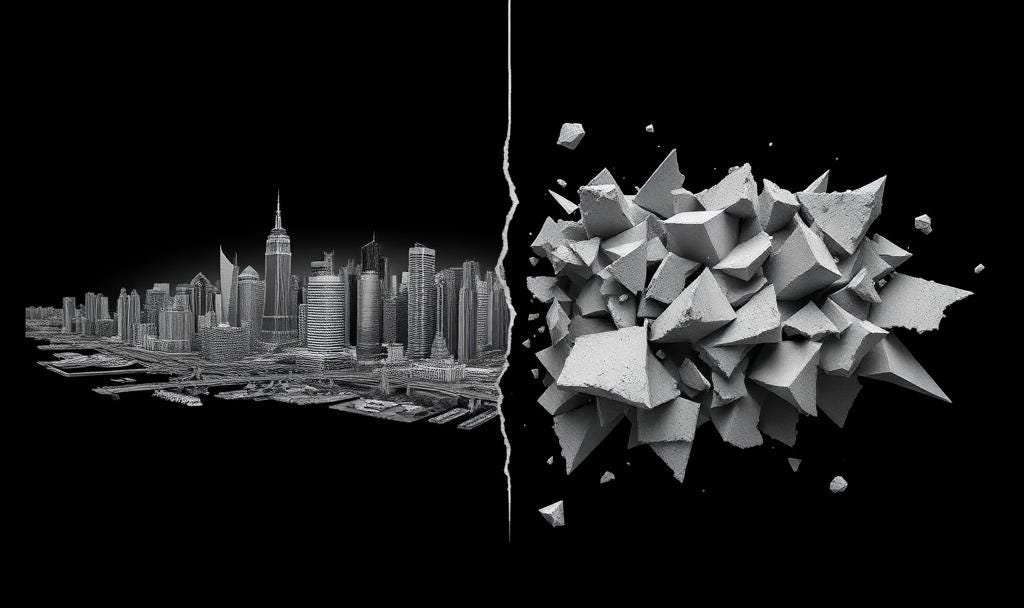Why Is There Something Rather Than Nothing?
The Foundational Thesis of The Absolute Philosophy
I. The Question and Its Shadow
With that question, Gottfried Wilhelm Leibniz, in his 1697 essay On the Ultimate Origination of Things, voiced the fundamental challenge of metaphysics. Centuries earlier, Parmenides declared, “What is, is,” affirming that non-being cannot be conceived. Centuries later, Martin Heidegger called it “the question of all questions,” shrouding it in existential wonder. Yet wonder yields no answers.
The question seems profound, as if nothingness could have prevailed and something emerged instead. But the moment it is asked, its illusion collapses. It is self-contradictory, for it assumes that nothingness could exist, could act, could give rise to being.
Nothingness cannot be. It cannot act, produce, or precede. To think of it is to smuggle existence back into thought. The question presupposes what it denies: a mind to ask, words to frame it, and a reality to question. The answer shines in every perception, every atom, every thought: existence exists.
II. The Absolute Axiom
An axiom is a truth so fundamental that to deny it is to affirm it. “Existence exists” is the absolute axiom, the cornerstone of The Absolute Philosophy, a system uniting metaphysical realism, rational epistemology, and the global heritage of reason. To doubt it demands a doubting mind, which exists. To ask “why” requires a questioner, a question, an act of inquiry: all grounded in reality.
This is the primacy of existence. Reality stands absolute, independent of any mind, will, or void. Consciousness is real, but its purpose is to grasp reality, not to invent it. A consciousness aware of nothing is a contradiction in terms.
Every achievement of man rests on this axiom. The farmer sows seeds, trusting their nature and the earth’s laws. The engineer builds bridges, relying on the unyielding facts of steel and gravity. The scientist probes the cosmos, certain that reality is knowable and consistent. To live, to think, to act is to affirm that A is A.
III. The Rivals of the Real
For centuries, thinkers have tried to challenge the most basic rule of all: that existence exists. They’ve claimed that the ultimate source of reality is not reality itself, but rather Mind, a Void, or a divine Deity. Every one of these challenges fails because it must secretly use the very existence it tries to replace.
Theistic Creation
Religious philosophers, like Aquinas and Leibniz, argue a divine being created everything from absolute nothingness (creatio ex nihilo).
The Problem with God as a Cause: If God has a mind or will, God already exists before the creation. You can’t create reality if you are already real. If you claim God is “beyond existence,” the argument collapses because literally nothingness cannot think, act, or cause anything.
The Problem with Perfection: Thinkers like Plotinus claimed existence “flows” from a perfect source, the “One.” But if the source is perfect, why is the world it produced so flawed and imperfect? Perfection should only create perfection.
The Problem with Necessity: Theists argue everything we see is contingent (it could not have existed), so there must be a necessary (must-exist) God at the end of the causal chain. Philosophers like Hume and Russell point out two flaws:
Why assume the chain of causes must stop? An infinite chain is logically possible.
If you accept that God can “just exist” without a cause (as a necessary being), then why can’t the universe itself “just exist” as the necessary foundation?
Theistic claims lean on the reality they aim to replace, leaving existence the unshakable foundation.
Theistic Concept (The Ontological Argument)
Philosophers like Anselm and later Plantinga tried to prove God simply by defining him: if God is a perfect being, he must exist, because existence is the greatest quality a being can have.
The Simple Refutation: Kant provided the definitive answer: Existence is not a property. It’s not a trait you can add to a list, like height or color. You can imagine a perfect pizza, listing all its qualities (cheesiest, biggest, best-tasting), but simply listing existence as one of those qualities doesn’t make the pizza suddenly appear.
The argument smuggles existence into its premise, collapsing in contradiction.
Idealism
Berkeley declared, “To be is to be perceived”, meaning reality only exists inside a mind (either yours or God’s). Hegel saw reality as the unfolding of one vast, cosmic Mind.
The Contradiction: This fails because a mind must have something real to be aware of. If the mind invents everything, what does the mind itself grasp? A consciousness aware of nothing is a nonsensical idea.
Consciousness apprehends reality; it does not conjure it. Idealism rests on the existence it rejects, and so it crumbles.
Phenomenology
Heidegger didn’t look for a cause; he asked, “Why is there Being rather than nothing?” and framed it as a profound, poetic mystery that human wonder unveils.
The Sidestep: This approach offers no answer, only a feeling. It’s a “poetic dodge.” To be able to wonder about “Being” and to talk about it requires that “Being” already exists. The act of questioning existence confirms the axiom.
To contemplate Being presupposes its reality, leaving the axiom untouched.
Nihilism and Positivism
Nihilists say life and reality have no meaning or value. Positivists like Ayer said that questions we can’t observe or scientifically test (like metaphysics) are simply meaningless.
Self-Defeat: These views are self-defeating. To declare that “nothing has meaning” is to assert a meaningful truth. Ayer’s own test, the verification principle, fails its own standard: there’s no way to scientifically verify the verification principle itself.
You must first know reality exists before you can dismiss it as meaningless or unknowable.
Scientific Reductionism
Physicists like Krauss claim the universe could have sprung from a quantum “nothing.”
The Misdirection: Philosophically, this isn’t true nothingness. The quantum vacuum is a field pulsing with energy, governed by immutable physical laws. Something with energy and laws is already a form of existence.
The Problem of Scope: Likewise, philosophical models like Plato’s Principle of Plenitude and cyclic universe theories assert all possibilities exist or recur, but they only explain what kind of universe we have, not why existence is real at all.
Mathematical Necessity: Other theorists like Gödel suggest that reality exists because of mathematical necessity. But equations are descriptions; they have no causal power. You can’t make a house appear just by writing the blueprints. Science is excellent at charting changes within reality, but it cannot explain the root source of reality itself.
Existence stands absolute, the ultimate cause of all causes, because it requires no source.
IV. The Lineage of Reality
The truth that existence exists is not a provincial or recent discovery. Throughout human history, independent cultures have converged on the principle that reality is absolute and that reason is the means of knowing it. Thirty-five major philosophical systems affirm this principle in varying degrees of consistency. Twenty-eight affirm it fully, recognizing existence as self-sustaining and uncaused. Seven affirm it partially, holding that reality is objective but dependent on a divine source. Together they form the global lineage of reason.
Ancient and Axial Age Foundations (c. 600 BCE – 300 CE)
1. Charvaka or Lokayata (Indian Materialism, c. 600 BCE)
Metaphysics: Matter alone exists, eternal and independent. There is no soul or afterlife.
Epistemology: Knowledge arises only from perception. Inference beyond direct evidence is invalid.
Agreement: Full.
2. Nyaya–Vaisheshika (Indian Logical Realism, c. 600–200 BCE)
Metaphysics: Reality consists of eternal, independent atoms and categories.
Epistemology: Knowledge arises from perception and inference, integrating sensory data by reason.
Agreement: Full.
3. Confucianism (Chinese Humanistic Rationalism, 551–479 BCE)
Metaphysics: Reality consists of objective patterns (li) inherent in nature.
Epistemology: Knowledge is gained by investigating things and cultivating rational understanding.
Agreement: Full.
4. Mohism (Chinese Utilitarian Logic, c. 470 BCE)
Metaphysics: The world is objective and analyzable.
Epistemology: Truth is established through logical analogy and sensory verification.
Agreement: Full.
5. Aristotelian Realism (Ancient Greek, c. 600–322 BCE)
Metaphysics: Existence consists of substances with identity. Nothing exists apart from the natural world.
Epistemology: Knowledge arises from sensory data organized by logic and abstraction.
Agreement: Full.
6. Epicureanism (Atomistic Materialism, 341–270 BCE)
Metaphysics: Atoms and void are eternal and absolute. There is no supernatural creation.
Epistemology: Reason integrates sensory impressions to reach certainty.
Agreement: Full.
7. Stoicism (Rational Cosmology, c. 300 BCE)
Metaphysics: The cosmos is rational and ordered by the divine logos.
Epistemology: Knowledge arises from rational assent to sensory impressions.
Agreement: Qualified, due to divine determinism.
8. Sankhya (Indian Dualistic Realism, c. 600 BCE–200 CE)
Metaphysics: Matter (prakriti) is eternal and independent. Consciousness (purusha) is separate but not creative.
Epistemology: Knowledge arises through perception and inference.
Agreement: Full.
9. Legalism (Chinese State Rationalism, c. 280 BCE)
Metaphysics: Reality and law are objective and impersonal.
Epistemology: Reason applies observation to the structure of society and statecraft.
Agreement: Full.
Medieval, Islamic, and Renaissance Traditions (c. 500 – 1700 CE)
10. Falasifa (Islamic Peripateticism, 980–1198 CE)
Metaphysics: Reality consists of essences and existences structured by reason.
Epistemology: Knowledge arises through sensory observation and rational inference.
Agreement: Qualified, due to divine unity as the ultimate source.
11. Mutazilism (Islamic Rational Theology, c. 776–868 CE)
Metaphysics: Reality and justice exist objectively and are knowable by reason.
Epistemology: Reason supersedes tradition in discerning truth.
Agreement: Qualified, due to theistic framework.
12. Thomism (Scholastic Synthesis, 1225–1274 CE)
Metaphysics: Reality is structured by act and potency; all being is created.
Epistemology: Knowledge arises through reason and sensory evidence.
Agreement: Qualified, because existence is made contingent on God.
13. Mimamsa (Indian Ritual Realism, c. 200 BCE–1000 CE)
Metaphysics: Dharma is an objective reality expressed in action.
Epistemology: Knowledge is derived through perception and interpretive reasoning.
Agreement: Qualified, due to scriptural dependence.
14. Neo-Confucianism (Chinese Rational Metaphysics, 1130–1200 CE)
Metaphysics: Principles (li) exist objectively in all things.
Epistemology: Knowledge results from rational investigation of nature.
Agreement: Full.
15. Zera Yacob’s Rationalism (Ethiopian Enlightenment, 1599–1692 CE)
Metaphysics: Reality is created and governed by universal law.
Epistemology: Reason is man’s natural faculty for discovering truth.
Agreement: Qualified, due to divine creation.
16. Persian Realism (Mulla Sadra, 1571–1640 CE)
Metaphysics: Existence is primary; essence is a mental abstraction.
Epistemology: Reason integrates sensory experience to identify reality.
Agreement: Qualified, due to theistic unity.
Indigenous and Regional Traditions (Independent Rationalism)
17. Maya Rationalism (Mesoamerican Philosophy, c. 300–900 CE)
Metaphysics: The universe operates by objective cycles and laws.
Epistemology: Knowledge arises from mathematical and astronomical observation.
Agreement: Full.
18. Dogon Cosmology (African Astral Realism, c. 1000 CE)
Metaphysics: The cosmos operates by objective astronomical order.
Epistemology: Knowledge is gained through empirical observation and oral rationality.
Agreement: Full.
19. Andean Philosophy (Inca–Quechua Realism, c. 1438–1471 CE)
Metaphysics: Reality is cyclical and governed by natural reciprocity (pachakuti).
Epistemology: Knowledge arises from observation and agricultural experimentation.
Agreement: Full.
20. Mapuche Cosmology (Andean–Chilean Realism, c. 1500 CE)
Metaphysics: The cosmos and land exist as objective, self-sustaining reality.
Epistemology: Knowledge arises from observation and collective reasoning.
Agreement: Full.
21. Rangaku (Japanese Empirical Rationalism, 1733–1817 CE)
Metaphysics: The physical world operates by discoverable laws.
Epistemology: Knowledge arises through empirical study and experiment.
Agreement: Full.
22. Sage Philosophy (African Oral Rationalism, 20th Century)
Metaphysics: Communal wisdom expresses objective reality.
Epistemology: Truth emerges through rational dialogue and reflection.
Agreement: Full.
23. Ubuntu (African Communal Rationalism, 20th–21st Century)
Metaphysics: Reality consists of objective interconnection among beings.
Epistemology: Knowledge arises through consensus guided by reason.
Agreement: Full.
Modern and Contemporary Realisms (c. 1700 – Present)
24. Classical Liberalism (Enlightenment Rationalism, 1632–1704 CE)
Metaphysics: Reality exists independently of perception.
Epistemology: Reason and evidence are the means of knowledge.
Agreement: Full.
25. Naïve Realism (Common-Sense Philosophy, 1710–1796 CE)
Metaphysics: The world exists as directly perceived.
Epistemology: Reason interprets perceptual data without skepticism.
Agreement: Full.
26. Austrian School (Praxeological Rationalism, 1881–1973 CE)
Metaphysics: Human action presupposes an objective world.
Epistemology: Reason deduces truth from the nature of purposeful behavior.
Agreement: Full.
27. Scientific Realism (Modern Analytic, 20th–21st Century)
Metaphysics: The entities and laws of science exist independently of observers.
Epistemology: Knowledge arises from experiment and logical inference.
Agreement: Full.
28. Critical Rationalism (Fallibilism, 1902–1994 CE)
Metaphysics: Reality is objective and testable.
Epistemology: Knowledge advances through conjecture and refutation.
Agreement: Full.
29. Secular Humanism (Modern Naturalism, 1925–2012 CE)
Metaphysics: The natural world is all that exists.
Epistemology: Knowledge arises through science and logical analysis.
Agreement: Full.
30. Critical Realism (Stratified Realism, 1944–2014 CE)
Metaphysics: Reality has layered causal structures independent of perception.
Epistemology: Reason discovers them through scientific analysis.
Agreement: Full.
31. Entity Realism (Scientific Particularism, b. 1936 CE)
Metaphysics: Individual entities are real if they can be causally manipulated.
Epistemology: Experimentation confirms existence.
Agreement: Full.
32. Structural Realism (Scientific Continuity, b. 1946 CE)
Metaphysics: Objective structures and relations persist through theory change.
Epistemology: Reason maintains empirical continuity across models.
Agreement: Full.
33. Evolutionary Epistemology (Naturalized Knowledge, 1916–1996 CE)
Metaphysics: Reality evolves through objective processes.
Epistemology: Knowledge develops as an adaptive response to reality.
Agreement: Full.
34. Direct Realism (Perceptual Immediacy, 1911–1960 CE)
Metaphysics: The external world is directly perceived and independent of mind.
Epistemology: Reason integrates sensory awareness without mediation.
Agreement: Full.
35. Objectivism (Ayn Rand, 1905–1982 CE)
Metaphysics: Existence exists. Reality is absolute and independent of consciousness.
Epistemology: Reason is man’s only means of knowledge, integrating perception into concept.
Agreement: Full.
Summary of the Lineage
Of these thirty-five systems, twenty-eight uphold the absolute primacy of existence and the sovereignty of reason. Seven affirm objectivity but retain divine dependence, making existence derivative. From Charvaka to Objectivism, the pattern is clear: wherever men used reason, they reached the same foundation.
From India’s pramanas to Greece’s logic, from Confucian li to the scientific method, every rational system converges on the same recognition. The Absolute Philosophy inherits this entire lineage and completes it, uniting all non-contradictory insights into one consistent whole: reality as the source of knowledge, value, and life.
V. The Meaning of the Question
“Why is there something rather than nothing?” is not a question about the origin of being. It is the confession of a philosophical error: the attempt to treat non-being as an alternative to existence. To ask for a cause of existence is to demand a cause for causality, a source for all sources. It treats “nothing” as a real rival to “something,” as if being were optional.
Existence is not a thing within reality; it is reality. It has no cause, because causality itself presupposes existence. The question dissolves when seen in full light: there is something rather than nothing because “nothing” is impossible.
Existence is the eternal fact, the self-sufficient starting point. Consciousness is the faculty that perceives it. Reason is the method that identifies it. Together, existence, consciousness, and reason form the irreducible trinity of all knowledge and all philosophy.
The Absolute Philosophy begins where every other stops: not by seeking a first cause, but by recognizing the first fact.
VI. The Practical Stakes
This is not an academic puzzle. It defines the foundation of every human life and the destiny of every civilization.
On the individual level, to grasp that existence exists is to accept the world as absolute and knowable. It is to reject the mystical belief that wishes can replace facts, and to understand that reason, not faith or emotion, is man’s only means of survival. Every act of integrity, every invention, every rational joy rests on that premise.
On the global level, the stakes are equally profound. The wars that devastate nations, the tyranny of ideologies, the rise of fanaticism, and the moral collapse of collectivist creeds all spring from a single root: the denial of reality. Every doctrine that preaches “higher truths” beyond reason, every dictatorship that treats men as means to an ideal, begins by rejecting the axiom that existence exists and that man’s mind is competent to know it.
The crisis of the modern world, whether religious, political, or psychological, is a crisis of metaphysics. Humanity’s survival depends on rediscovering the base it has forgotten: that facts are absolute, reason is sovereign, and nothing stands higher than reality.
VII. The Eternal Affirmation
The Absolute Philosophy does not offer a new mysticism or a new revelation. It restores man to the only realm he has ever truly possessed: reality.
To know is to live in allegiance to existence. To create is to shape matter in the image of reason. To love is to affirm the worth of consciousness and life.
There is no mystery deeper than the fact that something is. There is no wonder greater than the power to know it.
Existence exists. That is enough.



